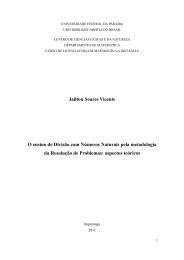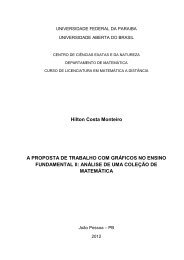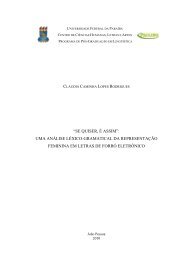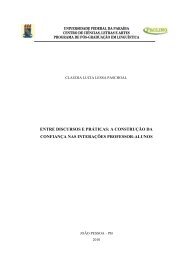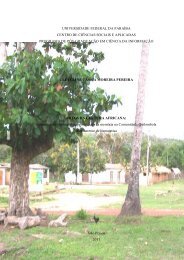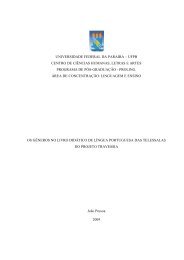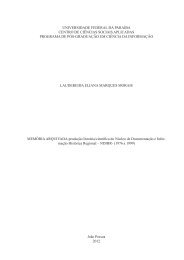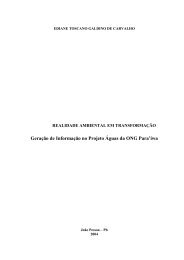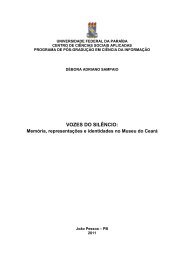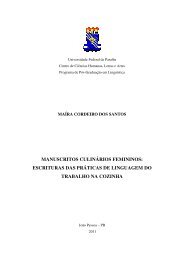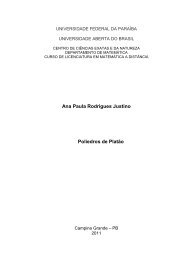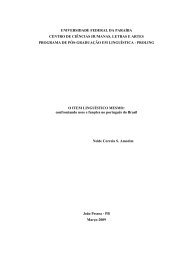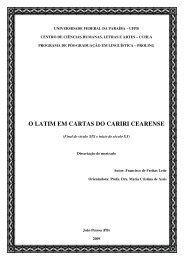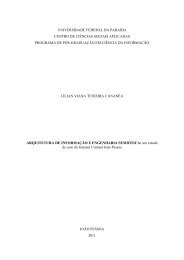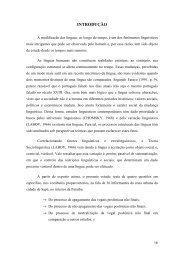Capa dissertação Mauriene - DSpace/UFPB (REI) - Universidade ...
Capa dissertação Mauriene - DSpace/UFPB (REI) - Universidade ...
Capa dissertação Mauriene - DSpace/UFPB (REI) - Universidade ...
You also want an ePaper? Increase the reach of your titles
YUMPU automatically turns print PDFs into web optimized ePapers that Google loves.
ABSTRACT<br />
The scholarly work, Speeches for the Formation of Linguistic Brazilianness: colonization,<br />
literature and language (s) in Brazil (XVI-XIX) is a study done upon a descriptiveanalytical<br />
bottom about the course and the ways in which the Lusitan conquest and<br />
colonization implemented the expropriation and hiding of indigenous languages by imposing<br />
the Portuguese Language as the sole source of communication between us, within a process<br />
clearly marked by the fury of wars of conquest and colonization, by the violence of disrespect<br />
for the Native American people and by the violent linguistic eurocentrism. The choice of this<br />
object of study is warranted due to the recurrence of this theme, that is, the endless debate<br />
about our linguistic identity. It is very frequent in our various cultural discourses, especially in<br />
literature and sociology, the thematization of national characteristics as crucial, to literary and<br />
sociological discourses, forming a interdiscursivity, that is, a hybrid discursive practice,<br />
inherent to all social uses of language. To achieve our purpose we choose, as corpus analysis,<br />
some sample texts, extracted from colonial works, written during our period of colonization,<br />
more precisely between the mid-sixteenth century and the first decades of the nineteenth<br />
century, when the political independence of Brazil from Portugal occurs, but not the end of<br />
the religious-linguistic clashes. Upon this historical phase we will examine the scriptural<br />
context of the Brazilian colonial period. Thus, we turn initially to the information of Jesuit<br />
Father Manuel da Nóbrega and José de Anchieta, about the sixteenth century, a context<br />
marked by wars and Jesuit settlements. For studies of the linguistic context of the seventeenth<br />
century, we will use, especially, the writings of Father Antonio Vieira and Poet Gregorio de<br />
Matos. With regard to the scriptural context of the eighteenth century, a period characterized<br />
by the expulsion of the Jesuits and the prohibition, by the Marquis of Pombal, of the use of<br />
indigenous languages, our analysis will be done through the reading Arcadian texts, especially<br />
those by Basílio da Gama e Santa Rita Durão. Regarding the first two decades of the<br />
nineteenth century, marked by the presence of D. Joao VI and the influx of several important<br />
European scientists in Brazil, the linguistic remarks peculiar to this period will be observed<br />
through the narratives of Germans Spix and Martius and Frenchman Jean-Baptiste Debret. In<br />
this understanding, we consider Fairclough’s theoretical and methodological paths as of<br />
paramount importance for our work. It is therefore through the proposed discourse analysis<br />
proposed by Fairclough, the textually-oriented discourse analysis (TODA), that we proceed to<br />
our analytical description of the speech-language identity in Brazil, written during the colonial<br />
period. By way of Fairclough, we conceive such texts as constituters and builders of our<br />
linguistic Brazilianness.<br />
Keywords: Linguistics. Literature. Language´s colonization. Brazilianness.



